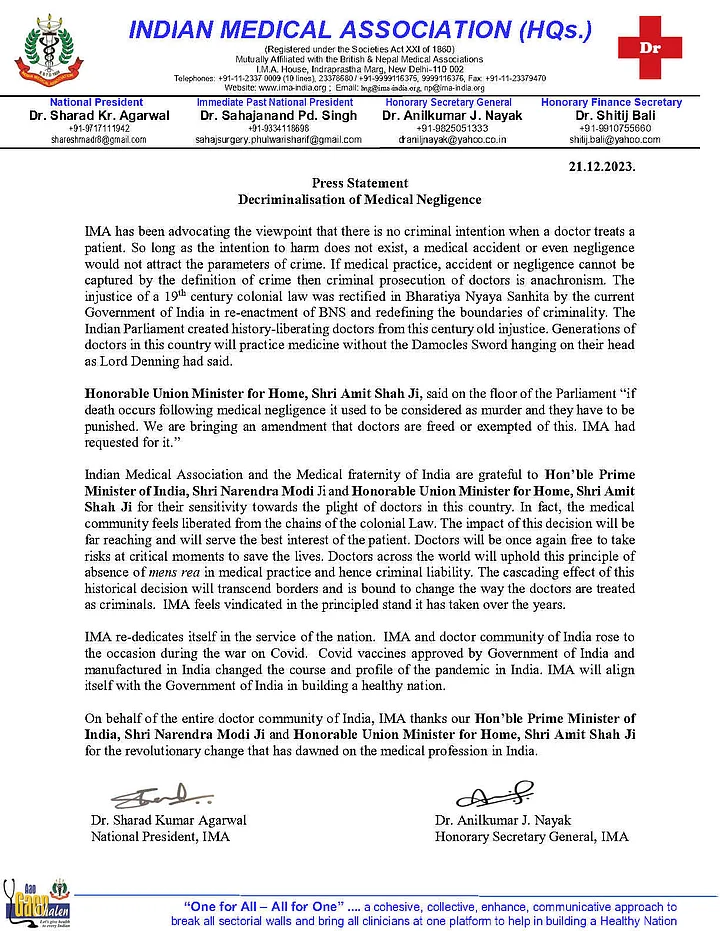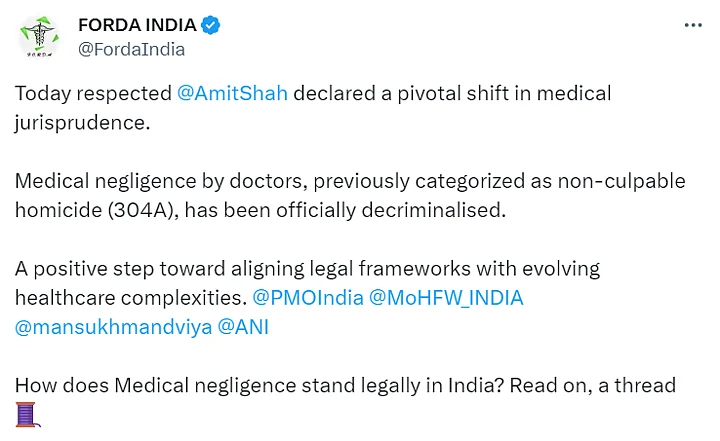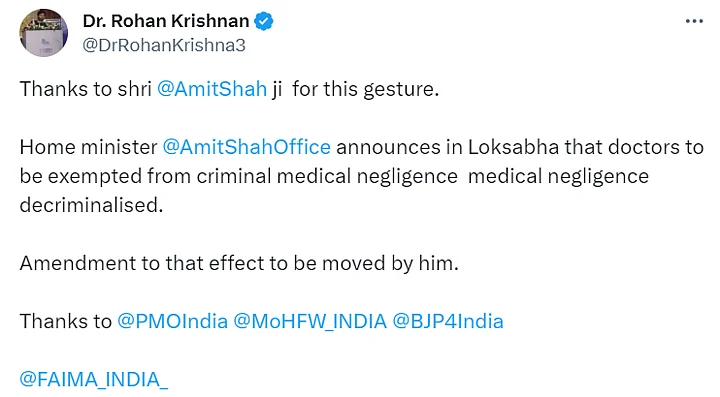Doctors will now be exempted from “criminal prosecution” in alleged medical negligence cases when a patient dies, according to the new Bharatiya Nyaya Sanhita (BNS), passed in the Parliament on Wednesday, 20 December.
The medical fraternity is hailing this “decriminalisation.” But those who have been victims of medical negligence are at crossroads about this amendment.
The Quint speaks to experts to understand what this means for doctors and for public health.
Medical Negligence 'Decriminalised': What Will Be the Impact? Experts Decode
1. What Does the New Law Say?
Union Home Minister Amit Shah announced in the Lok Sabha that the new criminal law bill will “exempt doctors” from prosecution in those cases where a patient dies due to alleged medical negligence.
“Currently, if there is a death due to negligence of a doctor, it is also treated as criminal negligence, almost akin to murder. Therefore, I will bring an official amendment to free the doctors from this criminal negligence. Indian Medical Association had urged us to look into the matter.”
Amit Shah in Lok SabhaWhat EXACTLY does the law say?
Section 304A of the Indian Penal Code, which was earlier in place, said, “Whoever causes the death of any person by doing any rash or negligent act not amounting to culpable homicide, shall be punished with imprisonment of either description for a term which may extend to two years, or with fine, or with both.”
But with the new amendment in place, medical negligence is still punishable with “imprisonment of either description for a term which may extend to 2 years, and shall also be liable to fine.”
However, it won’t attract criminal charges akin to murder as Section 304A of the IPC did.
Dr Pooja Tripathi, a public health expert, tells The Quint, "Medical negligence should be thoroughly investigated. There should be punishment and consequences, but not criminal charges."
The new law does this. It differentiates criminal negligence and medical negligence, and provides exemption to doctors from criminal prosecution only.
Expand2. Medical Fraternity Hails Decision
On 30 November, the Indian Medical Association had written to the Centre urging this very amendment.
Medical organisations like the IMA, the Federation of Resident Doctors’ Association, the Association of Indian Medicos, and the Federation of All India Medical Association took to X (formerly Twitter) to hail the decision.
Expand3. ‘Disheartened’: Victims of Medical Negligence
But for someone who has suffered the consequences of medical negligence, Malvika Dalvi (24), a Mumbai resident, says that the new amendment is “disheartening.”
On 20 June this year, her mother Kavita Dalvi passed away at a private hospital. Kavita was admitted to the hospital on 5 June and had to undergo an open heart surgery to get her heart valve replaced.
“My mother underwent an open heart surgery where a faulty valve was inserted. Then after complications arose, the same doctor performed another operation on her and she passed away. My mother was young and didn’t have comorbidities and the risk was minimal, the doctor himself told us.”
Malvika DalviKavita’s husband Vikas Dalvi tells The Quint, “Six months have passed since what happened to us. Still no FIR is launched.”
Malvika mentions that the family is still waiting for the postmortem report and the hospital committee’s report. She says that they’ve been told the case is under investigation.
Around the same time when Kavita passed away in June this year, Shilpa Reddy Dutla, a Hyderabad-resident, won a seven-year legal battle against a gynaecologist who was held guilty of medical negligence while treating Dutla's mother.
Dutla told Deccan Chronicle,
"All I wanted from the doctor was an admission of her grave mistake, an apology and remorse for the same. I found none of it in her, even after I won the case. But more importantly, I wanted to win the case to raise awareness about such negligence and encourage people to raise their voices."
Dutla is also right in wanting to raise awareness since these cases are not uncommon.
The National Consumer Disputes Redressal Commission, in April 2023, ordered a private hospital and two doctors in Kolkata to compensate the family of 37-year-old Kuntal Chowdhury after he died under their care, due to "wilful negligence" in July 2008. The family fought a 15-year-long legal battle before they got justice, the Times of India had reported.
In October, the the Delhi State Consumer Disputes Redressal Commission also directed a private hospital to pay Rs 9 lakh after three doctors failed to provide adequate treatment to the patient, according to Indian Express.
“The system is meant to protect doctors. If he’s not punished, what is stopping doctors from being careless? Or what is holding them accountable? Who will take the responsibility when there’s medical negligence?”
Malvika Dalvi to The QuintExpand4. ‘Will Help Doctors Work Fearlessly, Might Reduce Violence Against Doctors’
However, public health experts feel that's not the case since doctors will still be investigated if any case of alleged medical negligence comes up.
Speaking to The Quint, Dr Rajesh Sharma, Former Joint Director, Department of Health, Government of Chhattisgarh, says:
“Doctors were charged with Section 304A and tried like murder cases if a patient died under their care. Doctors can now work free from any fear. And when doctors can treat patients without any fear for their own lives, they’ll be encouraged to treat patients better and provide better care.”
Dr Tripathi agrees with Dr Sharma.
She says, “Medical field is the only profession where the stakes are as high as life and death. A doctor never has the intent to kill, medical negligence can happen in any case even when the doctor is trying their 100 percent.”
Dr Tripathi goes on to say that with the increasing violence against doctors, this is a welcome move. On 10 May this year, a 22-year-old house surgeon Dr Vandana Das was attacked by a patient and succumbed to her injuries at Kerala's Kottarakkara Taluk Hospital.
This was not a one-off incident. Speaking to The Quint in May, Dr Sulphi N, IMA Kerala chairman, claimed that over 200 attacks have taken place against doctors in Kerala in the last three years.
A not-for-profit organisation Insecurity Insight had in 2021 reported that 133 attacks took place against healthcare workers in 2020, the year India was battling with the COVID-19 pandemic and the lockdown.
But there are other reasons too, Dr Tripathi adds. One is that, she says, that doctors and their reputations can be wrongfully tarnished. But that was actually not the case in the IPC too.
According to the older law, the burden of proof in medical negligence cases lied on the patient.
Areeb Uddin Ahmed, a Lucknow-based lawyer, earlier this year, told The Quint that a patient or their kin have to establish that a doctor-patient relationship existed, that the doctor "owed a duty of care," that they breached that duty, and the patient was caused "injury or harm."
However, in cases where medical negligence is apparent, the doctrine of Res Ipsa Loquitur (the thing speaks for itself) is attracted.
However, now that the law has been amended, Dr Tripathi says it might change things for the better for medical practitioners. She also goes on to add that, a lot of times, doctors don’t have resources at their disposal, like when a practitioner is posted in smaller villages or district hospitals.
“Could medical negligence in the public health system be a doctor’s fault? Should they be labelled as criminals?”
Dr Pooja TripathiExpand
What Does the New Law Say?
Union Home Minister Amit Shah announced in the Lok Sabha that the new criminal law bill will “exempt doctors” from prosecution in those cases where a patient dies due to alleged medical negligence.
“Currently, if there is a death due to negligence of a doctor, it is also treated as criminal negligence, almost akin to murder. Therefore, I will bring an official amendment to free the doctors from this criminal negligence. Indian Medical Association had urged us to look into the matter.”Amit Shah in Lok Sabha
What EXACTLY does the law say?
Section 304A of the Indian Penal Code, which was earlier in place, said, “Whoever causes the death of any person by doing any rash or negligent act not amounting to culpable homicide, shall be punished with imprisonment of either description for a term which may extend to two years, or with fine, or with both.”
But with the new amendment in place, medical negligence is still punishable with “imprisonment of either description for a term which may extend to 2 years, and shall also be liable to fine.”
However, it won’t attract criminal charges akin to murder as Section 304A of the IPC did.
Dr Pooja Tripathi, a public health expert, tells The Quint, "Medical negligence should be thoroughly investigated. There should be punishment and consequences, but not criminal charges."
The new law does this. It differentiates criminal negligence and medical negligence, and provides exemption to doctors from criminal prosecution only.
Medical Fraternity Hails Decision
On 30 November, the Indian Medical Association had written to the Centre urging this very amendment.
Medical organisations like the IMA, the Federation of Resident Doctors’ Association, the Association of Indian Medicos, and the Federation of All India Medical Association took to X (formerly Twitter) to hail the decision.
‘Disheartened’: Victims of Medical Negligence
But for someone who has suffered the consequences of medical negligence, Malvika Dalvi (24), a Mumbai resident, says that the new amendment is “disheartening.”
On 20 June this year, her mother Kavita Dalvi passed away at a private hospital. Kavita was admitted to the hospital on 5 June and had to undergo an open heart surgery to get her heart valve replaced.
“My mother underwent an open heart surgery where a faulty valve was inserted. Then after complications arose, the same doctor performed another operation on her and she passed away. My mother was young and didn’t have comorbidities and the risk was minimal, the doctor himself told us.”Malvika Dalvi
Kavita’s husband Vikas Dalvi tells The Quint, “Six months have passed since what happened to us. Still no FIR is launched.”
Malvika mentions that the family is still waiting for the postmortem report and the hospital committee’s report. She says that they’ve been told the case is under investigation.
Around the same time when Kavita passed away in June this year, Shilpa Reddy Dutla, a Hyderabad-resident, won a seven-year legal battle against a gynaecologist who was held guilty of medical negligence while treating Dutla's mother.
Dutla told Deccan Chronicle,
"All I wanted from the doctor was an admission of her grave mistake, an apology and remorse for the same. I found none of it in her, even after I won the case. But more importantly, I wanted to win the case to raise awareness about such negligence and encourage people to raise their voices."
Dutla is also right in wanting to raise awareness since these cases are not uncommon.
The National Consumer Disputes Redressal Commission, in April 2023, ordered a private hospital and two doctors in Kolkata to compensate the family of 37-year-old Kuntal Chowdhury after he died under their care, due to "wilful negligence" in July 2008. The family fought a 15-year-long legal battle before they got justice, the Times of India had reported.
In October, the the Delhi State Consumer Disputes Redressal Commission also directed a private hospital to pay Rs 9 lakh after three doctors failed to provide adequate treatment to the patient, according to Indian Express.
“The system is meant to protect doctors. If he’s not punished, what is stopping doctors from being careless? Or what is holding them accountable? Who will take the responsibility when there’s medical negligence?”Malvika Dalvi to The Quint
‘Will Help Doctors Work Fearlessly, Might Reduce Violence Against Doctors’
However, public health experts feel that's not the case since doctors will still be investigated if any case of alleged medical negligence comes up.
Speaking to The Quint, Dr Rajesh Sharma, Former Joint Director, Department of Health, Government of Chhattisgarh, says:
“Doctors were charged with Section 304A and tried like murder cases if a patient died under their care. Doctors can now work free from any fear. And when doctors can treat patients without any fear for their own lives, they’ll be encouraged to treat patients better and provide better care.”
Dr Tripathi agrees with Dr Sharma.
She says, “Medical field is the only profession where the stakes are as high as life and death. A doctor never has the intent to kill, medical negligence can happen in any case even when the doctor is trying their 100 percent.”
Dr Tripathi goes on to say that with the increasing violence against doctors, this is a welcome move. On 10 May this year, a 22-year-old house surgeon Dr Vandana Das was attacked by a patient and succumbed to her injuries at Kerala's Kottarakkara Taluk Hospital.
This was not a one-off incident. Speaking to The Quint in May, Dr Sulphi N, IMA Kerala chairman, claimed that over 200 attacks have taken place against doctors in Kerala in the last three years.
A not-for-profit organisation Insecurity Insight had in 2021 reported that 133 attacks took place against healthcare workers in 2020, the year India was battling with the COVID-19 pandemic and the lockdown.
But there are other reasons too, Dr Tripathi adds. One is that, she says, that doctors and their reputations can be wrongfully tarnished. But that was actually not the case in the IPC too.
According to the older law, the burden of proof in medical negligence cases lied on the patient.
Areeb Uddin Ahmed, a Lucknow-based lawyer, earlier this year, told The Quint that a patient or their kin have to establish that a doctor-patient relationship existed, that the doctor "owed a duty of care," that they breached that duty, and the patient was caused "injury or harm."
However, in cases where medical negligence is apparent, the doctrine of Res Ipsa Loquitur (the thing speaks for itself) is attracted.
However, now that the law has been amended, Dr Tripathi says it might change things for the better for medical practitioners. She also goes on to add that, a lot of times, doctors don’t have resources at their disposal, like when a practitioner is posted in smaller villages or district hospitals.
“Could medical negligence in the public health system be a doctor’s fault? Should they be labelled as criminals?”Dr Pooja Tripathi




